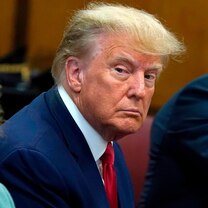Presidential Candidates' Proposed Solutions Differ on America's Opioid Epidemic
Trump emphasizes border security, while Clinton focuses on treatment.
— -- With 78 people dying each day in the U.S. from an opioid overdose, the epidemic is a critical concern for many communities and law enforcement and public health agencies.
But the nation's opioid crisis has barely been mentioned in the presidential race.
In yesterday's presidential debate, Republican nominee Donald Trump brought the issue up briefly, apparently as a means to criticize Democratic rival Hillary Clinton's position on border control.
"I was up in New Hampshire the other day," Trump said in the debate. "The biggest complaint they have with all of the problems going on in the world, their single biggest problem is heroin, that pours across our southern border, just pouring, and destroying their youth. It is poisoning the blood of their youth and plenty of other people. We have to have strong borders, we have to keep the drugs out of our country."
The crisis has grown steadily for at least 15 years with the number of overdose deaths involving opioids nearly quadrupling since 1999, according to the CDC. In 2014, the last year for which data is available, a record 28,000 Americans died from an opioid overdose.
The problem received some attention during the presidential primaries because of how it has ravaged New Hampshire, an important primary state.
During the general election, the crisis has received less emphasis on the campaign trail. But the Republican and Democratic candidates offer starkly different approaches. Trump focuses on border control to stem the flow of illegal drugs into the country, while Clinton calls for a public health approach.
How Trump Has Said He Will Tackle the Opioid Epidemic
Trump calls for improving border control, beefing up the criminal justice system to punish drug offenders and improving access to treatment for recovering addicts, although he has largely shied away from details on the issue.
In prepared remarks for a speech the GOP nominee gave Saturday in New Hampshire, he emphasized his proposal to build a wall along the Mexican border, saying, "a wall will not only keep out dangerous cartels and criminals, but it will also keep out the drugs and heroin poisoning our youth."
Trump lauded how his running mate, Indiana Governor Mike Pence, has in his state "increased the mandatory minimum sentences for the most serious drug offenders, while expanding access to treatment and prevention options for those struggling with addiction." He also criticized President Obama's approach toward criminal justice reform for drug offenders, claiming that the president "has commuted the sentences of record numbers of high level drug traffickers, many of them kingpins, and violent armed traffickers with extensive criminal histories."
Trump also proposed expanding access to opioid antidotes that can be used by emergency responders to treat overdoses and has called for expanding the availability of drug treatment, including for people covered by Medicaid.
How Clinton Has Said She Will Tackle the Opioid Epidemic
Democratic nominee Hillary Clinton outlines on her website a $10 billion, 10-year, five-part plan that focuses on treating the epidemic as a public health issue rather than a criminal problem and increasing access to prevention, education and treatment programs.
"We’re not just now ‘discovering’ this problem," Clinton says on her website. "But we should be saying enough is enough. It’s time we recognize as a nation that for too long, we have had a quiet epidemic on our hands. Plain and simple, drug and alcohol addiction is a disease, not a moral failing—and we must treat it as such."
Her five-part plan is broken down into programs for prevention, treatment and addiction recovery. She calls for ensuring that all first responders have the opioid antidote Naloxone, retraining prescribers about the dangers of opioid addiction and reforming the criminal justice system to prioritize rehabilitation and treatment over prison sentences for nonviolent, low-level, drug offenders.
ABC News' Gillian Mohney contributed to this report




